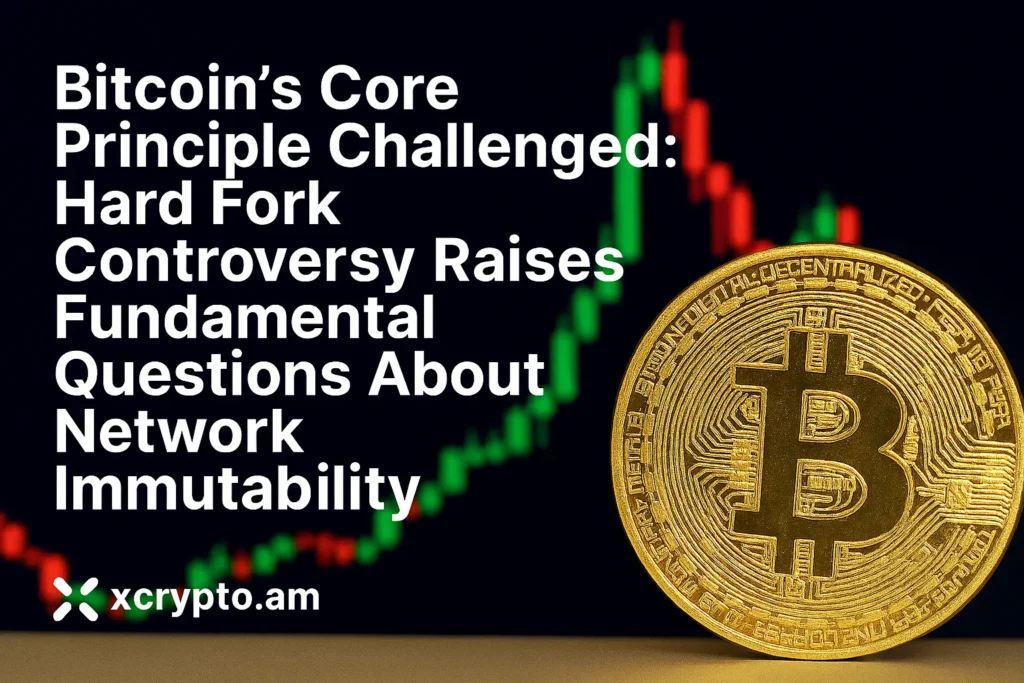A potentially explosive leak has sent shockwaves through the Bitcoin ecosystem, raising profound questions about the network’s foundational principles and future trajectory. The controversy centers around alleged private communications from Luke Dashjr, maintainer of Bitcoin Knots, that purportedly outline a radical hard fork proposal—a revelation that has triggered intense scrutiny of Bitcoin’s governance model and its celebrated immutability.
The storm erupted on September 25 when independent publication The Rage released what it claimed were private messages from the prominent developer. According to their report, these communications detailed plans for establishing a trusted multisignature committee with unprecedented authority to review and potentially alter blockchain content retroactively. The scope of this proposed oversight reportedly extended beyond universally condemned material like child abuse imagery to encompass various “non-monetary” uses of the Bitcoin blockchain.
The leaked material gained immediate traction due to one particularly provocative statement attributed to Dashjr: “either Bitcoin dies or we have to trust someone.” This remark, when circulated across social media platforms, struck many observers as a direct challenge to Bitcoin’s core value proposition—the guarantee that once transactions receive confirmation, they become permanent, unchangeable components of an immutable ledger.
Dashjr responded to the allegations with forceful denial, categorically dismissing The Rage’s report as “fake news” and “fabricated nonsense.” In multiple public statements, he emphasized that he had never formally proposed such a hard fork mechanism, characterizing the leak as a malicious attempt to damage his reputation within the Bitcoin community. His position received support from fellow developers, including Taproot Wizards co-founder Udi Wertheimer, who questioned the authenticity and context of the allegedly leaked messages.
The controversy emerges against a backdrop of ongoing technical debates within Bitcoin development circles. Current discussions surrounding Bitcoin Core version 30 have reignited longstanding tensions about the protocol’s fundamental purpose. The update removes the traditional 80-byte default cap for OP_RETURN fields—the mechanism enabling users to attach additional data to transactions, widely utilized by Ordinals inscriptions and similar metadata applications. This technical adjustment has intensified broader philosophical disagreements about whether Bitcoin should maintain its purity as a monetary ledger or evolve to accommodate diverse data types.
According to the leaked framework, the proposed multisignature committee would identify specific content categories for removal from the blockchain, potentially including not only illegal material but also inscription activity labeled as “spam.” The controversial innovation involved replacing this pruned content with zero-knowledge proofs—cryptographic methods that permit transaction verification without revealing underlying data. While this approach might maintain mathematical consistency across nodes, it would fundamentally alter Bitcoin’s historical record-keeping by creating non-uniform blockchain copies across the network.
The Bitcoin community’s reaction to these allegations has been swift and sharply divided. Adam Back, Blockstream CEO and respected cryptographer, expressed serious concerns about the potential censorship implications, noting that the proposal appeared to move “straight to the censorship tech” without adequate safeguards. Meanwhile, analyst Pledditor highlighted the unusual absence of any formal proposal through standard channels like developer mailing lists or GitHub repositories, suggesting that private conversations were being misrepresented as concrete plans.
This incident evokes memories of Bitcoin’s previous governance crises, particularly the contentious 2017 hard fork that created Bitcoin Cash. Historical precedent demonstrates that successful protocol changes require broad community consensus, with controversial proposals often resulting in permanent chain splits rather than unified upgrades. The SegWit2x initiative of 2017, despite substantial institutional backing, ultimately collapsed due to resistance from developers and node operators who perceived it as undermining Bitcoin’s decentralized governance model.
The current controversy touches upon fundamental tensions within the Bitcoin ecosystem. Proponents of content moderation argue that certain data types expose the network to legal challenges and reputational damage that could hinder mainstream adoption. Conversely, privacy advocates maintain that any form of censorship, even when implemented through sophisticated cryptographic techniques, represents an unacceptable compromise of Bitcoin’s core values regarding censorship resistance and transaction immutability.
As the debate continues to unfold, the Bitcoin community faces critical questions about how to balance evolving regulatory pressures with steadfast commitment to the principles that have defined the network since its inception. The outcome of this discussion may significantly influence not only Bitcoin’s technical development but also its philosophical identity as it navigates the challenges of increasing adoption and regulatory scrutiny.



